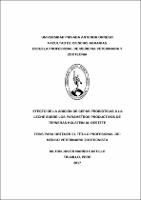Efecto de la adición de cepas probióticas a la leche sobre los parámetros productivos de terneras Holstein al destete

View/
Download
(application/pdf: 432.7Kb)
(application/pdf: 432.7Kb)
Date
2017Author(s)
Narro Castillo, Nilton Javier
Metadata
Show full item recordAbstract
La investigación se llevó a cabo en el establo lechero “El Milagro”,
localizado en el distrito de Huanchaco, departamento de la Libertad, Perú,
con el objetivo de determinar el efecto de la adición de cepas probióticas
en la leche sobre parámetros productivos y de salud de terneras hasta el
destete. Para ello se emplearon 10 terneras de la raza Holstein, separadas
de sus madres después de su nacimiento, las mismas que recibieron
suministro de calostro por tres días y leche a partir del cuarto día de
nacidas. Se separaron aleatoriamente, en dos grupos de número igual de
terneras y recibieron los tratamientos SP: Leche sin cepas probióticas y CP:
Leche con cepas probióticas; el suministro de probióticos fue por tres días
consecutivos a partir del cuarto día de nacidas. No se encontraron
diferencias estadísticas significativas en los parámetros de ganancia de
peso total, incremento en los consumos semanal y total de alimento
(P>0.05). Si bien el porcentaje de diarreas fue 0% y 40% en terneras con
probióticos y sin probióticos, respectivamente, sin embargo esta variación
no fue significativamente diferente (P>0.05). Se concluye que la adición de
cepas probióticas en la alimentación de terneras por tres días no influye
significativamente en los parámetros estudiados. The research was carried out in the dairy stable ““El Milagro““, located
in the district of Huanchaco, department of La Libertad, Peru, with the
objective of determining the effect of the addition of probiotic strains in milk
on the productive parameters of calves at weaning. To that end, 10 Holstein
heifers, separated from their mothers after bi rth, these calves received
colostrum for three days and milk from the fourth day of birth, randomly
separated into two groups of equal number of calves that received the
following treatments: SP: Milk without Probiotic strains and CP: Milk with
probiotic strains; these calves received Probiotic strain by three consecutive
days from the fourth day of birth. No significant statistical differences were
calculated in the parameters of total weight increase, weekly and total feed
intake (P> 0.05). Despite the percentage of diarrhea was 0% and 40% in
with and without probiotics respectively, no statistical differences were
founded (P> 0.05). It is concluded that the addition of probiotic strains in the
feeding of calves for three days does not influence signi ficantly the
parameters that were studied.
Collections
- Veterinaria y Zootecnia [196]

